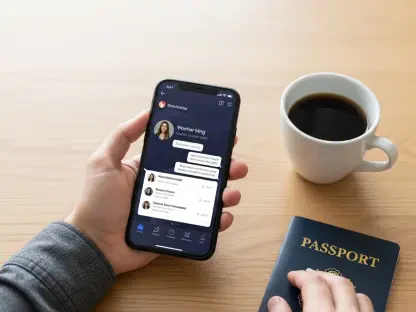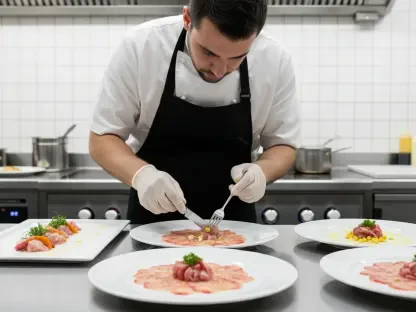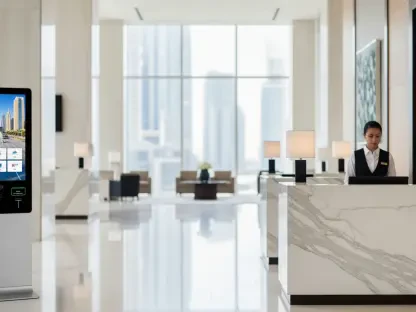In the realm of luxury hospitality, personalization has become the gold standard, emerging as a vital element that meets the demands of discerning travelers who seek more than just lavish accommodations and top-tier services. This quest for unique and memorable experiences is where big data steps in, transforming how luxury brands curate customized experiences that go beyond the standard to create lifelong memories.
The Core Theme: Personalization in Luxury Hospitality
Understanding Personalization
Personalization in luxury hospitality involves more than mere customer recognition. It encompasses anticipating guests’ needs, addressing their preferences, and offering surprises that resonate personally. Given the exclusivity and individuality that define luxury, personalized services can elevate a stay from merely satisfactory to exceptional. Personalized service in luxury hospitality is about knowing more than a guest’s name; it’s about seamlessly providing exactly what they need and want, often before they even realize they need it. By leveraging insights from big data, luxury hotels can compile detailed guest profiles that reveal intimate preferences and behavioral patterns, allowing them to deliver incredibly tailored experiences ranging from welcome amenities to customized room settings.Furthermore, such personalization has a significant psychological impact on guests. When guests feel understood and valued on a personal level, their satisfaction significantly increases, enhancing their overall experience. The interconnected nature of various service elements—whether it’s dining, accommodation, or leisure activities—can drastically shape a guest’s overall perception of the hotel. Anticipating needs and preferences not only meets guests’ expectations but often surpasses them, creating memorable moments that foster loyalty and long-term relationships. This is particularly crucial in an industry where the client base is not just looking for comfort and convenience but true distinction and meaning in every interaction.
Importance in Luxury Sector
In luxury hospitality, the need for personalized experiences is more pronounced. Discerning travelers expect not just high-quality services but also unique touches that make their stay memorable. Personalized experiences differentiate brands in a market where every detail matters. The ability to transform a stay from routine to extraordinary hinges on the fine subtleties that big data helps reveal. Imagine a returning guest arriving to find their favorite wine already in their suite or being greeted with a personalized itinerary for an art tour, curated based on their previous activities and interests. This level of attention to detail can only be achieved through meticulous data collection and analysis.What sets luxury experiences apart are the emotional and sensory engagements they evoke. In the luxury sector, offering tailored services based on personal histories, likes, and dislikes is essential to providing a sublime experience that meets—and exceeds—expectations. This level of personalized service not only enhances the immediate experience but also builds brand loyalty. Guests are more likely to return when they feel that the service is unwaveringly attentive to their unique tastes and preferences, turning one-time visitors into repeat customers. With numerous options available, luxury accommodations that excel in personalization set themselves apart from competitors, creating a significant advantage in a highly competitive marketplace.
Big Data: The Backbone of Bespoke Experiences
Data Collection and Insights
Big data serves as the engine driving these personalized experiences. By collecting vast amounts of information from different touchpoints, luxury brands can achieve a deep understanding of their guests. Data is sourced from past bookings, social media engagements, online preferences, and feedback surveys, creating comprehensive guest profiles that capture not just preferences but also habits and aspirations. For instance, by examining data such as a guest’s social media posts, browsing history, and past feedback, hotels can craft a guest profile that includes preferred room settings, culinary tastes, and even favorite leisure activities.This wealth of information paves the way for highly precise and effective personalization. Each data point adds another piece to the puzzle, allowing luxury hotels to assemble an accurate and detailed picture of each guest. The richness of this data means that hotels can move beyond generic predictions to highly specific anticipations of guests’ needs, from booking and check-in to dining and special events. By understanding patterns and trends in guest behavior, luxury hotels can also refine their services, ensuring that they are not only personalized but also trend-conscious and forward-thinking. This leads to a higher level of guest satisfaction and an overall enhanced luxury experience.
Tailored Recommendations
With detailed guest profiles, luxury hotels can make tailored recommendations ranging from dining options to leisure activities. For example, a guest who enjoys art could receive suggestions for local art exhibits or a private museum tour, enhancing their overall experience. The personalized approach ensures that every aspect of a guest’s stay is thoughtfully considered and curated to match their interests and preferences, providing a seamless and highly enjoyable experience. This goes beyond superficial personalization, delving deep into the likes, dislikes, and aspirations of each guest to deliver experiences that resonate on a personal level.Moreover, these tailored recommendations often serve as delightful surprises for guests. When a hotel can anticipate and address unspoken desires, it creates a sense of care and consideration that turns a good stay into an exceptional one. For instance, knowing that a guest is a foodie and recommending a private dinner with a renowned local chef, or organizing a day filled with artistic explorations for an art lover, elevates the guest’s experience. This level of attention not only increases immediate satisfaction but also leaves lasting impressions, cementing the hotel’s reputation as a provider of unique, memorable, and highly personalized luxury experiences.
Customization in Accommodation, Dining, and Experiences
Tailoring Accommodations
One key aspect is the use of big data to tailor accommodations meticulously. Details such as room temperature, lighting settings, preferred amenities, and even pillow types can all be customized. For example, The Ritz-Carlton’s “Mystique” program employs big data to analyze and customize guest experiences, from welcome amenities to in-room technology settings. A guest might find their favorite snacks and beverages pre-stocked or a room filled with a preferred fragrance. Such meticulous attention to detail ensures that guests feel a sense of familiarity and comfort, making the environment feel more like a home away from home.Furthermore, this level of accommodation customization can contribute to a guest’s overall well-being and satisfaction. The luxury experience is not just about opulence but also about comfort and ease. For instance, a guest with allergies might appreciate hypoallergenic bedding, or a business traveler could benefit from a room setup that includes a fully equipped office space. These thoughtful touches, made possible by big data insights, can significantly enhance the guest’s experience, making their stay both relaxing and uniquely suited to their needs. By continually refining and expanding the data collected, luxury hotels can persistently improve their services, maintaining high levels of guest satisfaction and fostering brand loyalty.
Personalized Culinary Experiences
Culinary experiences in luxury hospitality can also be significantly enriched through personalization. By analyzing guests’ dietary restrictions and past dining experiences, hotels can craft bespoke menus. Examples include creating a surprise tasting menu with favorite ingredients or arranging private chef experiences. Jumeirah’s “Meet the Chef” program exemplifies this by allowing elite members to connect with renowned chefs, witness culinary artistry, and enjoy personalized, gourmet food creations. An exclusive masterclass with a Michelin-starred chef illustrates the high level of bespoke culinary experiences offered to guests, turning a simple meal into a memorable gastronomic adventure.This personalized approach extends beyond merely meeting dietary needs and preferences; it’s about creating a cohesive and immersive dining experience tailored to individual tastes. Whether it’s a breakfast customized to suit a guest’s morning ritual or a multi-course dinner that reflects their culinary passions, these personalized touches significantly elevate the dining experience. This level of personalization not only delights the palate but also caters to aesthetic and sensory engagements, making dining a key aspect of the overall luxury experience. Furthermore, it showcases the hotel’s commitment to providing exceptional and individualized service, bolstering the guest’s perception of the brand as attentive and considerate.
Unique Bespoke Adventures
Big data enables the crafting of unique adventures tailored to guests’ interests and passions. Whether it is a private helicopter tour, a behind-the-scenes museum visit, or a personalized shopping spree with a renowned stylist, the possibilities are nearly limitless. The Peninsula Hotels’ “Peninsula Academy” exemplifies this by offering curated experiences, such as private art tours or cultural immersion programs. For instance, The Peninsula Academy in New York provides guests with a private guided tour of The Museum of Modern Art outside regular hours, allowing a special interaction with world-renowned contemporary art collections.These exclusive experiences offer more than just luxury; they provide guests with unique stories and memories that last a lifetime. Personalized adventures cater to the specific interests and passions of the guests, offering them an opportunity to engage with their surroundings in a meaningful way. Whether it’s a wine-tasting tour in Napa Valley, a private beach picnic in the Maldives, or a behind-the-scenes tour of a historical landmark, these bespoke offerings are designed to provide a unique perspective and unparalleled access. Such experiences not only enhance the immediate stay but also enrich the guest’s overall travel narrative, making each stay at the hotel a chapter in their personal story.
Ethical Considerations
Data Privacy
Despite the promising potential of big data in luxury hospitality, ethical considerations regarding data collection and privacy are paramount. It’s crucial for luxury brands to prioritize transparency and obtain explicit consent from guests before data collection and analysis. This involves informing guests about what data is being collected, how it will be used, and ensuring that they have the option to opt out of data collection activities. Transparent practices help build trust, reassuring guests that their personal information is being handled responsibly and ethically.Moreover, clear and concise communication about data privacy policies can further enhance guest confidence. Providing guests with easily accessible information about data collection procedures, data encryption, and privacy safeguards fosters a sense of security and trust. This transparency is essential in maintaining a positive relationship with guests, who are more likely to appreciate and participate in personalized services when they feel their privacy and personal information are being respected. Therefore, ethical data collection and transparency are not just legal formalities but critical components in cultivating trust and loyalty in the luxury hospitality sector.
Data Security
Moreover, implementing robust data security measures to protect sensitive guest information is essential to maintaining trust and loyalty. Ensuring that personal data is handled with care is critical to fostering long-term relationships with guests. This involves deploying advanced security infrastructure, such as encryption and secure servers, to protect data from unauthorized access and breaches. Regular audits and updates of security protocols can prevent vulnerabilities, ensuring that guest data remains safe and secure. The cost of data breaches, both financially and in terms of reputation, makes robust data security practices an imperative.In addition, luxury hotels should establish comprehensive data security policies, including staff training on data protection and cybersecurity best practices. Employees must be aware of the importance of data security and be equipped to handle information responsibly. Furthermore, having a contingency plan in place for potential data breaches and ensuring swift, transparent communication with guests in such events can help mitigate damage and restore confidence. By prioritizing data security alongside personalized service, luxury hotels can provide guests with peace of mind, knowing that their personal information is in safe hands. This balance of personalization and privacy forms the foundation of a responsible and sustainable approach to modern luxury hospitality.
Future of Personalization in Luxury Hospitality
Advancements in Technology
Looking ahead, the future of personalization in luxury hospitality appears bright, driven by the rapid evolution of technology. Anticipated advancements include more sophisticated tools and techniques, such as artificial intelligence-powered chatbots that can predict guests’ needs and virtual reality previews that offer personalized itineraries. With AI capabilities, hotels can continuously analyze real-time data to refine and enhance the guest experience further. For instance, AI chatbots could make instant recommendations based on a guest’s preferences, or adjust room settings dynamically as the guest’s needs evolve throughout their stay.Moreover, virtual reality (VR) and augmented reality (AR) technologies are set to revolutionize personalized previews and planning. Guests can preview rooms, amenities, and even local attractions virtually before their stay, customizing their itinerary to match personal preferences. These technologies also offer innovative opportunities for pre-arrival engagement, allowing guests to interact with digital concierges and tailor their experiences before they even set foot on the property. Such tech-driven personalization not only enhances the planning and enjoyment of the stay but also aligns with the modern, tech-savvy luxury traveler’s expectations.
Expanding Possibilities
In luxury hospitality, personalization has become the gold standard, addressing the desires of discerning travelers who seek more than just lavish accommodations and top-tier services. These sophisticated guests crave unique, memorable experiences that set apart their stay from the ordinary. This is where big data plays a crucial role, revolutionizing how luxury brands can tailor-make experiences that go beyond the usual offerings to create lifelong memories.Big data analytics enables luxury hotels to collect and process vast amounts of information about guest preferences, behaviors, and past interactions. This allows them to offer highly customized services, from personalized room settings to bespoke dining experiences and tailored activities. For example, a hotel can know a guest’s favorite type of pillow or preferred dining style even before they check in. This level of personalization ensures that every aspect of the stay is aligned with the guest’s expectations and desires.By leveraging big data, luxury hospitality brands can elevate the entire guest experience, transforming standard services into extraordinary moments that leave a lasting impression.









